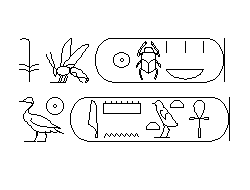
King of the 18th Dynasty, born during the reign of Amenhotep IV/Akhenaten, who is often considered to be his father (Kiya is perhaps his mother). In the temple of Luxor, Tutankhamun states that Amenhotep III is his father, but it is assumed that this is merely an attempt to blot out the memory of the reign of the heretic Akhenaten by completely ignoring it, or else that the word 'father' here should be interpreted as 'forefather'. The king was originally called Tutankhaten, but later he changed his name, probably another indication that he wanted to distance himself from the reign of Akhenaten, who had proclaimed the god Aten as the only god and denied the other gods, closed their temples and made the priests redundant. Tutankhamun was only a child of about nine when he ascended the throne after the short reign of Smenkhkare; it is therefore probable that others took the actual decisions, among them Ay and Horemheb. The king very soon abandoned Akhetaten, before the end of his second regnal year, and moved the court to Memphis. The tombs of important officials, such as Horemheb and Maya, are situated in Saqqara, the necropolis of Memphis. In Memphis, Tutankhamun initiated a period of restoration of the temples and cults of the gods. The stela on which this decree is preserved was erected in the temple of Karnak and then usurped by Horemheb when he eventually became king. Apart from this politically important decision, Tutankhamun was an unimportant pharaoh. He is primarily known because of the discovery of his virtually intact tomb in the Valley of the Kings, found by Howard Carter in 1922. This tomb, consisting of four small chambers, was probably not originally meant for him but for one of his high officials. It is assumed that he was buried here after his unexpectedly early death, after nine regnal years, because his original tomb was not yet ready. It has been suggested that it was originally intended for Ay, who later became king but at the time was still a high court official. Once he became king Ay presumably took over the tomb originally intended for Tutankhamun.